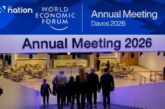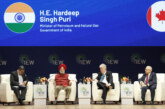
Dr. Arvind Kumar*

India’s Presidency of the Shanghai Cooperation Organization (SCO) has come at a time when the global economy and landscape is facing significant challenges due to various prevailing issues. There are newer challenges such as the recovery from the Covid-19 pandemic, the Russia-Ukraine conflict, challenges of economic recovery, obstacles in global supply chains, and energy and food crises along with the changing geopolitical scenarios that are rapidly shifting in the region. By reinforcing mutually beneficial cooperation, preventing confrontation and conflict, and maintaining equal and indivisible security, SCO aims to build a just polycentric world order, in full conformity with the norms of international law and principles of mutual respect, which meets the interests of each and every State, taking into account their mutual needs and aspirations. As a multinational and multicultural organization, SCO strives to stave off the clash of civilizations. Such international grouping and its presidencies provide the right opportunity to showcase its leadership prospects especially given the need for consensus among all major countries in mitigating challenges that are only increasing.
SECURE in the theme of the 21st SCO Summit, which stands for citizen security, economic growth, regional connectivity, unity, respect for sovereignty and integrity, and environmental protection. In the rapidly changing geopolitical landscape of the Eurasian region, initiatives suggested by PM Modi should be at the forefront of New Delhi’s priorities under its SCO presidency. At the recent SCO meeting in New Delhi Home Minister Amit Shah said that India attaches special importance to the SCO in promoting dialogue on the subject relating to multidimensional political, security and economic issues.
Apart from its initiatives that enhance the grouping’s priorities, the central focus in the SCO’s platform has also remained on the region’s security prospects. Strengthening the region by promoting the cooperation specifically pertaining to sectors such as security and trade among the key priorities for members and to expand the cooperation to include mechanisms that could enhance security ties. Terrorism is a domain that has caused significant obstacles for all of the member states of the SCO and countries have initiated counter-terrorism channels to upgrade the priorities of the grouping above and over a regional pact focusing on trade and development and has also called for greater cooperation on infrastructure development, energy, and connectivity to enhance regional economic growth and prosperity which on its part could significantly reduce the security issues faced by the member-states of the SCO grouping. India’s SCO Presidency has also been marked by its emphasis on cultural and people-to-people exchanges. The country has proposed a number of initiatives aimed at promoting cultural and educational exchanges among SCO member states, with a view of promoting greater understanding among the region’s diverse cultures.
Significance of India’s Presidency

India’s presidency of both the G20 and the SCO is a great reminder of its growing influence not only in its own region but globally. The fact that this opportunity is being utilised to its maximum effect is a testimony to its growing influential role and should be made the most out of as far as diplomatic outlook is concerned. The mutual interest between the countries in the region as well as with the other members must be utilized to its full potential in promoting regional integration and cooperation through the SCO grouping. Although the presidency also reflects upon India’s bid to gain international legitimacy that can elevate it to be situated in decision-making bodies in global governance. These mutual admirations for certain values should be capitalized upon as well to be able to fully utilise the presidency to its maximum effect in such a manner that elevates not only bilateral ties but also enables regional development.
In an endeavour to lead the global world, the focus has majorly relied on advocating regional development through such multilateral platforms. The regional agendas have laid emphasis on the climate crisis as well as mitigation against climate change. More so, India has also been conducting meetings regarding the advents of facing environmental concerns arising from such rapid alterations in the climate along with proposing unified responses. It has emphasized the need for taking strong and decisive action to address the global climate crisis, with a particular focus on the role of renewable energy and green technologies.
Towards positive multilateralism
In 2022, India assumed the presidency of the SCO, marking a significant milestone in the country’s role in regional cooperation and its endeavour of advocating for an integrated neighbourhood. Notably, the addition of India and Pakistan to the SCO expanded the grouping to represent around 40 per cent of the total population and 30 per cent of the world’s GDP share in 2017. The group includes countries such as China, Kazakhstan, Kyrgyzstan, Russia, Tajikistan, Uzbekistan, India, and Pakistan and covers over 60 per cent of the Eurasian landmass.
This is worth mentioning here that the SCO presidency is preceded by India’s non-permanent membership in the United Nations Security Council and would be followed by India hosting the G-20 summit. Thus, the tenure will reflect any continuity or change in New Delhi’s understanding of multilateralism and its behaviour in international and regional organisations. The larger SCO now has greater visibility and political and economic development potential. Cultural trends will be reenergized as a result of this extension. Because Central Asia is a landlocked region, the entry of states like India and Iran to the SCO has not only improved communication between South, Central, and West Asia. Still, it will also strengthen Central Asian strategic autonomy. The expansion of the SCO may provide a potential balancing agent to dominant powers such as Russia and China for Central Asian countries.
In an era of multilateral and multi-vector foreign policy, SCO can be harnessed to ensure greater harmony amongst the member countries to meet common challenges and geostrategic concerns. So far, Russia and China seem to be in the driver’s seat of SCO; however, India, with its growing regional and global economic clout and strong intellectual capital, has to think in terms of investing its diplomatic capital in evolving SCO’s agenda and progressive programme.
Way forward
Though SCO aims to upgrade and solidify the antiterrorism capabilities with the core principle of non-intervention, India must use its growing economic clout and substantial intellectual capital to pitch strongly for a coherent policy on illicit drug trafficking. As most member countries in the SCO face drug problems of alarming proportions, New Delhi has to consider investing its diplomatic capital in evolving a progressive programme for the monthly sharing of narcotics data. New Delhi must leverage its SCO presidency to ensure greater harmony amongst the member countries to meet this shared challenge which can be leveraged through people centric approach and 1.5 diplomacy and platforms like SANS and others can be instrumental in taking these discussions to another level.
The Indian presidency of the SCO has a lot of potential. New Delhi needs to emphasize shared cultural heritage as a unifying factor because it is a civilizational state and has close ties to all of the member nations. Second, challenges related to connectivity and trade development should be seriously discussed. India’s presidency must navigate a complex agenda while producing tangible results. In the complex rubric of changing geopolitical strategies and interests especially after Pakistan’s positive consent to attend the SCO meeting in Goa, India will have to maintain a fine balance between its SCO and G 20 presidency if it intends to make any meaningful impact. India, for its part, has so far chosen to take the ‘constructivist’ approach that can be leveraged to make the SCO a platform of agreements rather than disagreements.
*Editor, Focus Global Reporter



